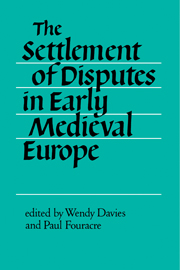Book contents
- Frontmatter
- Contents
- List of figures
- Preface
- Abbreviations
- Introduction
- 1 Disputes in late fifth- and sixth-century Gaul: some problems
- 2 ‘Placita’ and the settlement of disputes in later Merovingian Francia
- 3 Dispute settlement in Carolingian West Francia
- 4 People and places in dispute in ninth-century Brittany
- 5 Visigothic law and regional custom in disputes in early medieval Spain
- 6 Land disputes and their social framework in Lombard–Carolingian Italy, 700–900
- 7 Dispute settlement in the Byzantine provinces in the tenth century
- 8 Charters, law and the settlement of disputes in Anglo-Saxon England
- 9 Dispute settlement in medieval Ireland: a preliminary inquiry
- 10 An early modern postscript: the Sandlaw dispute, 1546
- Conclusion
- Appendix texts of the documents discussed
- Glossary
- List of works cited
- Index
Conclusion
Published online by Cambridge University Press: 11 January 2010
- Frontmatter
- Contents
- List of figures
- Preface
- Abbreviations
- Introduction
- 1 Disputes in late fifth- and sixth-century Gaul: some problems
- 2 ‘Placita’ and the settlement of disputes in later Merovingian Francia
- 3 Dispute settlement in Carolingian West Francia
- 4 People and places in dispute in ninth-century Brittany
- 5 Visigothic law and regional custom in disputes in early medieval Spain
- 6 Land disputes and their social framework in Lombard–Carolingian Italy, 700–900
- 7 Dispute settlement in the Byzantine provinces in the tenth century
- 8 Charters, law and the settlement of disputes in Anglo-Saxon England
- 9 Dispute settlement in medieval Ireland: a preliminary inquiry
- 10 An early modern postscript: the Sandlaw dispute, 1546
- Conclusion
- Appendix texts of the documents discussed
- Glossary
- List of works cited
- Index
Summary
THE RÔLE OF WRITING IN THE RESOLUTION AND RECORDING OF DISPUTES
As an alternative to papyrus or parchment, stone has certain obvious advantages as a medium in which records may be made and preserved. However, if the stonemason's skill is not necessarily less than that of the scribe, his rate of production is slower and the fruits of his labour more expensive and harder to store. Thus, it may be true, as asserted, that in Armenia under the rule of the Bagratid dynasty (861–1045) deeds of foundation and donation were recorded in the form of monumental inscriptions carved on stone, but if so such acts could only have been those of the highest and the wealthiest in the land. Such a procedure would hardly be justified, if indeed possible, for the sale of a field, let alone of a pig. It is impossible to credit that a society, wedged between two such bureaucratic neighbours as Byzantium and the ‘Abbāsid Caliphate, and with such strong late Antique traditions of its own, did not make extensive use of written as well as carved records, the subsequent total disappearance of which its later history easily explains. The study of documents in the period with which this book has been concerned is the study of the accidents of survival.
This accepted, it would be little of an exaggeration to say that all of the successor states to the Roman empire are marked by their employment of writing in governmental and private transactions, and by their attempts, however circumscribed, to preserve the resulting records, and that for practical rather than antiquarian reasons.
- Type
- Chapter
- Information
- The Settlement of Disputes in Early Medieval Europe , pp. 207 - 240Publisher: Cambridge University PressPrint publication year: 1986
- 5
- Cited by



